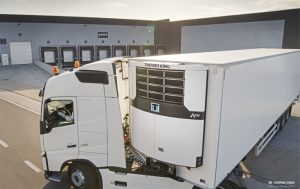Innovations in Refrigeration Logistics: Keeping It Cool
The Crucial Role of Refrigeration Logistics
In today’s interconnected global economy, the efficient transport of perishable goods is paramount. From fresh produce to pharmaceuticals, maintaining optimal temperatures during transit is essential to preserving quality and ensuring safety. This is where refrigeration logistics steps in, providing the critical infrastructure needed to keep products cool and viable throughout their journey from farm or factory to consumer. Frosty Frontiers: Innovations in Refrigeration Logistics
The Evolution of Refrigeration Technologies
Refrigeration logistics has come a long way since its inception. Early refrigeration methods relied on ice or cooling agents like ammonia, which were effective but limited in scope and efficiency. However, advancements in technology have revolutionized the field, enabling more precise temperature control and greater flexibility in transportation methods.
1. Smart Refrigeration Systems
One of the most significant innovations in refrigeration logistics is the development of smart refrigeration systems. These systems leverage sensors, data analytics, and automation to monitor temperature conditions in real-time and adjust settings accordingly. By continuously monitoring factors such as ambient temperature, humidity, and product load, smart refrigeration systems can optimize energy usage and maintain consistent temperatures, reducing the risk of spoilage and ensuring product quality.

2. Cryogenic Cooling
Another groundbreaking technology in refrigeration logistics is cryogenic cooling. By utilizing liquefied gases such as nitrogen or carbon dioxide, cryogenic cooling systems can achieve ultra-low temperatures far below those achievable with traditional refrigerants. This capability is particularly valuable for preserving highly sensitive or delicate products, such as certain medications or biological samples, where precise temperature control is critical.
3. Blockchain-enabled Cold Chain Management
In recent years, the integration of blockchain technology has emerged as a game-changer in cold chain management. By providing an immutable and transparent record of transactions and temperature data at each stage of the supply chain, blockchain enables greater accountability and traceability, reducing the risk of temperature excursions and potential spoilage. This not only enhances product safety but also facilitates compliance with regulatory requirements and quality standards.
Challenges and Opportunities
While innovations in refrigeration logistics offer tremendous benefits, they also present challenges that must be addressed. One such challenge is the high upfront cost associated with implementing advanced refrigeration technologies. However, the long-term cost savings and improved efficiency provided by these innovations often outweigh the initial investment.
Additionally, the global nature of modern supply chains introduces complexities such as varying regulatory standards and infrastructure limitations in different regions. Overcoming these challenges requires collaboration and coordination among stakeholders across the supply chain, as well as ongoing investment in infrastructure and technology.
Despite these challenges, the opportunities presented by innovations in refrigeration logistics are vast. From reducing food waste and improving access to fresh produce in underserved areas to enhancing the safety and efficacy of pharmaceuticals, the potential benefits extend far beyond the realm of commerce.
The Future of Refrigeration Logistics
Looking ahead, the future of refrigeration logistics promises even greater advancements and innovations. Technologies such as artificial intelligence and machine learning hold the potential to further optimize temperature control and predictive maintenance, ensuring the reliability and efficiency of refrigeration systems.
Furthermore, the growing emphasis on sustainability and environmental stewardship is driving the development of eco-friendly refrigerants and energy-efficient cooling solutions. By minimizing carbon emissions and reducing reliance on fossil fuels, these innovations not only benefit the planet but also contribute to cost savings and long-term sustainability.
In conclusion, innovations in refrigeration logistics play a vital role in ensuring the safe and efficient transport of perishable goods worldwide. From smart refrigeration systems to blockchain-enabled cold chain management, these advancements are revolutionizing the way we preserve and transport temperature-sensitive products. As technology continues to evolve and new challenges arise, continued investment and collaboration will be essential in shaping the future of refrigeration logistics and meeting the needs of a rapidly changing world.


Recent Comments